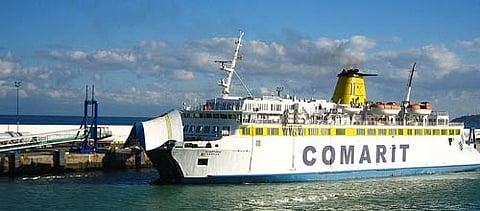

The long-running financial crisis affecting leading Moroccan shipping company Comanav-Comarit* took an unexpected judicial turn in mid-June when the company's former chairman and chief executive was arrested along with five other people.
Taoufik Ibrahimi, who is credited with having overseen the privatisation of the company in 2007, has been held in preventive custody since June 15, along with two of his former executives and the general secretaries of the dockers' and seafarers' unions of the Union Marocaine du Travail (UMT).
They were held for several days before the Rabat appeal court revealed in a statement that they were suspected of having conspired to "sabotage structures, ports and ships, endanger state security, reveal professional secrets and impede freedom to work."
According to Moroccan press reports, these accusations refer principally to events at the port of Tanger Med in May, when cranes were used at one point to block the movement of ships, including those of Grandi Navi Veloci, the company which has replaced Comanav-Comarit on services to Morocco from the French port of Sète.
The reports noted that Comanav-Comarit employees had also occupied the company's head office and the maritime affairs department in Casablanca during the same period.
They said that Ibrahahimi and his fellow detainees had been accused of having organised these incidents.
The Moroccan press made the link between these accusations and Ibrahimi's reported attempted to mount a rescue bid for Comanav-Comarit, which has been virtually unable to operate since the beginning of the year after having had most of its ships arrested in French and Spanish ports because of unpaid debts.
In an attempt to get the company back into operation in time for the summer migration of Moroccan workers from Europe, he sought to bring its vessels back into service under charter but, finally, failed to get the backing he needed for the operation from the banks and the government.
The arrests provoked considerable emotion in Morocco. Ibrahimi himself is a high-profile figure, who, after leaving Comanav in 2010, served a short period as chief executive of the Tanger Med authority.
Also among those arrested were the former head of the government's fisheries department, Mohamed Rami, who was an advisor to the former head of Comanav, and Abderrahim Mendour, former head of human resources at Comanav, who is currently head of human resources for the Moroccan subsidiaries of France's CMA CGM shipping group.
The International Transport Workers' Federation (ITF) took up the cause of the two trade union leaders arrested – Saïd El Hairech, general secretary of the UMT dockers' union, and Mohamed Chamchati, general secretary of the UMT seafarers' union.
It called for their immediate release, claiming that it was clear that the men had been going about their normal, lawful trade union business and affirming that there had been an "error of understanding".
ITF general secretary David Cockcroft said in a letter to the Moroccan ambassador in London, "We understand that the arrests followed telephone interceptions in which normal trade union discussions have been misinterpreted as somehow threatening your nation's security. Common sense suggests otherwise and we trust that the examining magistrates will promptly reach this same conclusion and spare the men further detention and their families further distress."
While the controversy over the arrests rages, eight Comanav-Comarit ships remain detained in Spanish and French ports, several of them with crews still aboard despite several months without pay.
On the day that Mr. Ibrahimi and his colleagues were arrested, Comanav-Comarit chairman Abdelali Abdelmoula wrote to employees to say that the company had a last chance of being rescued by an unnamed Italian investment fund which was prepared to invest €40 million (USD48.8 million) in it.
He said that the fund had tied its investment to a number of conditions, however. These included a corresponding €25 million (USD30.5 million) investment from the Moroccan government, cancellation of the company's bank debt, rescheduling of its debt to suppliers and a guarantee of five years of industrial peace from the unions.
Andrew Spurrier
*Comanav-Comarit comprises the former passenger ferry business of the Comanav group and the Comarit ferry company, previously controlled by Norway's Fred. Olsen group. The group's current owner, Abdelali Abdelmoula, took control of Comarit in 2008 and acquired Comanav Ferry in 2009 from France's CMA CGM, which had taken over the Comanav group from the Moroccan state in 2007.
Image source: Matt Perreault
